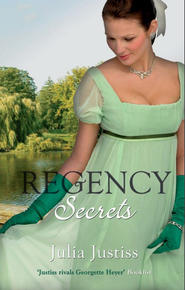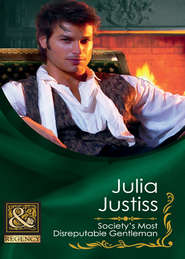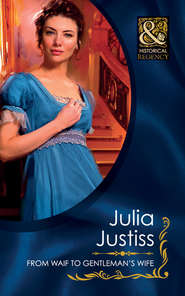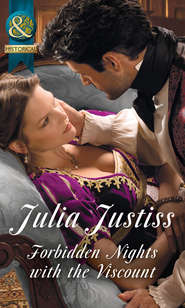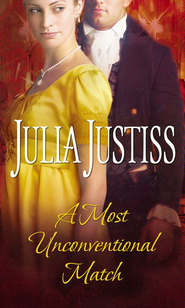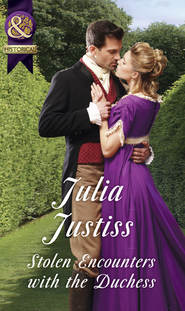По всем вопросам обращайтесь на: info@litportal.ru
(©) 2003-2025.
✖
Wicked Wager
Настройки чтения
Размер шрифта
Высота строк
Поля
“Perhaps, but you did, and I shall never forget that.” Hastings took a sip before saying diffidently, “My father’s investments in the India trade prosper. Should you find yourself a trifle under the hatches, I’m sure he—”
“No need. I shall come about shortly. As soon as I decide which tender virgin to honor with the offer of my hand,” he added, trying to keep bitterness from his voice.
“’Twould be a sensible solution,” Hastings said with a nod. “Have you anyone in mind?”
“I’m still, shall we say, reconnoitering the ground.”
Hastings’s eyes brightened and he set down his glass. “You remember ‘Guinea’ Harris, don’t you?”
“That corporal in first company who could shoot the center out of a yellow boy from fifty paces?”
“Yes. I saw him just last week. His father’s some sort of banker in the city, full of juice, if rumor can be believed. Perhaps you ought to call on him. Mr. Harris might be able to suggest suitable bridal candidates for a man who, like his son, survived Waterloo.”
Probably Banker Harris, like most people awed by the great and terrible victory over the French, thought “Waterloo survivor” was synonymous with “courage.”
Tony knew he didn’t qualify. But he couldn’t afford to be too finicky about honor. An influential City banker would be of great help in finding him an heiress to marry.
And so, despite his discomfort, he made himself say, “If the opportunity should arise, I’d like to meet him.”
“I’d be happy to arrange it. Mayhap ‘Guinea’ Harris’s papa can send some golden coins rolling in your direction!”
Tony murmured his gratitude. He ought to feel encouraged—and virtuous, that he’d made himself take this first step toward the solution everyone was recommending. A solution that was both logical and commonplace. Most men of his station married to secure alliances and fortunes.
Hadn’t he, once upon a time, urged Jenna to make just such a match—with him? Though, he recalled with a grin, the bargain had been rather one-sided: her fortune for his somewhat tarnished title. Ah, what a coxcomb he’d been!
But though he had certainly coveted her fortune, there had been something about Jenna, something beyond an undeniably strong physical attraction, that had drawn him and made the idea of marrying her compelling even to a man who scoffed at the notion of love and fidelity.
Her serenity, sense of honor and courage, perhaps, qualities that had resonated when tried by the adversities of war like the steel of the finest saber.
Qualities that drew him still.
Miss Sweet’s final legacy, he thought with a self-mocking smile. Somehow in his youth she’d managed to instill deep within him an ironic yearning for purity and valor, qualities he himself had never possessed. A yearning unlikely to be satisfied in the match between avarice and social advantage he was now contemplating.
Though he’d lately come to believe that courage, honor and fidelity were possible, he wasn’t sure he yet believed in lifelong, selfless love. Not for Anthony Nelthorpe.
So why did the notion of binding himself in a loveless marriage of convenience continue to seem so distasteful?
Chapter Seven
A WEEK LATER, JENNA REPOSED in the sitting room adjoining her chamber while Cousin Lane settled a shawl about her shoulders. “Rest a while longer, Jenna. I’ve business this morning, but this afternoon, if the weather holds fair, I shall try to tempt you out for a carriage ride.” He stroked her cheek gently. “Promise me you’ll consider it, eh? That pretty face is far too pale.”
“Thank you, cousin. I will consider it,” she answered politely, then sighed with relief when he exited the room.
She turned her gaze to the window. It was fair today, she noted, though whether it was sun or rain mattered little to her. A book lay on the table beside her, a gift, Sancha told her, from Lord Nelthorpe—of all people! And though she found the author, one Jane Austen, quite clever, Jenna hadn’t read more than a page.
Her unfocused gaze caught on the play of dust motes as they rose and fell in a sunbeam. Drifting, like she was.
Sancha would push her to ride out with Cousin Lane. Probably better to go with him than be maneuvered into accompanying Lady Montclare, who was sure to press her once Aunt Hetty informed the sisters during their daily call that the doctor had pronounced her fully recovered.
“Fully recovered.” How little the doctor knew!
It seemed someone was always trying to bully her into doing this or that, when all she wished to do was sit in her chair or lie in her bed with her face to the wall and remain in that blessed, blank place without thought or feeling in which she’d floated since her accident.
She remembered nothing between riding toward the park that morning and waking, like a swimmer submerged, to a flicker of shapes and a distant murmur of voices. Compelled by some urgency, despite the pain in her body, she’d made herself battle upward to the light, struggling to stay conscious and focus on the words the doctor was uttering to Sancha. A weeping Sancha, who wrung her hands and whispered “My poor lady.”
Blow. Head. Recover. Lost. Son.
With a supreme effort she moved one hand to her belly, suddenly aware of pain there that nearly equaled the pounding in her head.
Sorry. Nothing. I. Could. Do.
“Here’s tea,” Sancha’s voice startled her. The maid set the tray on the side table. Frowning, she plucked the shawl from Jenna’s shoulders and tossed it aside.
“No more sitting, lazy one! Today you go out into the sun.” The maid went to pull a pelisse from the wardrobe.
Jenna eyed the garment with distaste. “I don’t wish to go out.”
“You did not wish to stop medicine. Or see cousins, or los señoras with fancy gowns and scorpion tongues. Ah, much you have lost! But you must go on.” Sancha poured a cup of tea. “Drink now. You are colonel’s daughter, eh?”
I don’t know who I am, Jenna thought. But after a moment, having neither strength nor interest enough for a battle of wills, as she had since Sancha had weaned her from the laudanum and forced her back to the world of consciousness, Jenna followed orders and took a sip.
“I bring this.” Sancha held up an envelope. “From the Handsome One with the rogue’s eyes who waits below.”
Nelthorpe? Jenna wondered with a faint stir of interest. But that brief emotion faded once she discovered the note Sancha presented came from Mr. Fitzwilliams.
Idly she scanned his standard expression of regret, about to put it aside when the last two lines snagged her attention. “Though I hesitate to intrude upon your grief, my aunt, Lady Charlotte, begs leave to visit. She has suffered as you suffer and earnestly desires to help.”
Could anyone help? Kind thoughts aside, Lady Charlotte Darnell was but a stranger, and Jenna was already surrounded by surfeit of well-meaning strangers.
How she longed for the strong, sympathetic shoulder of Harry or Alastair, the comforting arms of her dead mother! Only Sancha knew her intimately enough to appreciate the devastation of her loss—and she had never borne a child.
Suddenly a deep desire swept through her to meet this woman who, if Jenna were interpreting Fitzwilliams’s note aright, had lost a child, as she had.
“Is Mr. Fitzwilliams still below?”
“Aye, mistress. A beautiful lady waits with him.”
“Show them up, please. And fetch more tea.”
Sancha smiled and dipped a curtsy. “Si, mistress!”
The moment after Sancha left, Jenna regretted the impulse to allow their visit. Had she not already sustained a steady stream of visitors, patting her hand and expressing their deepest condolences?
Вы ознакомились с фрагментом книги.
Приобретайте полный текст книги у нашего партнера:
Приобретайте полный текст книги у нашего партнера:






